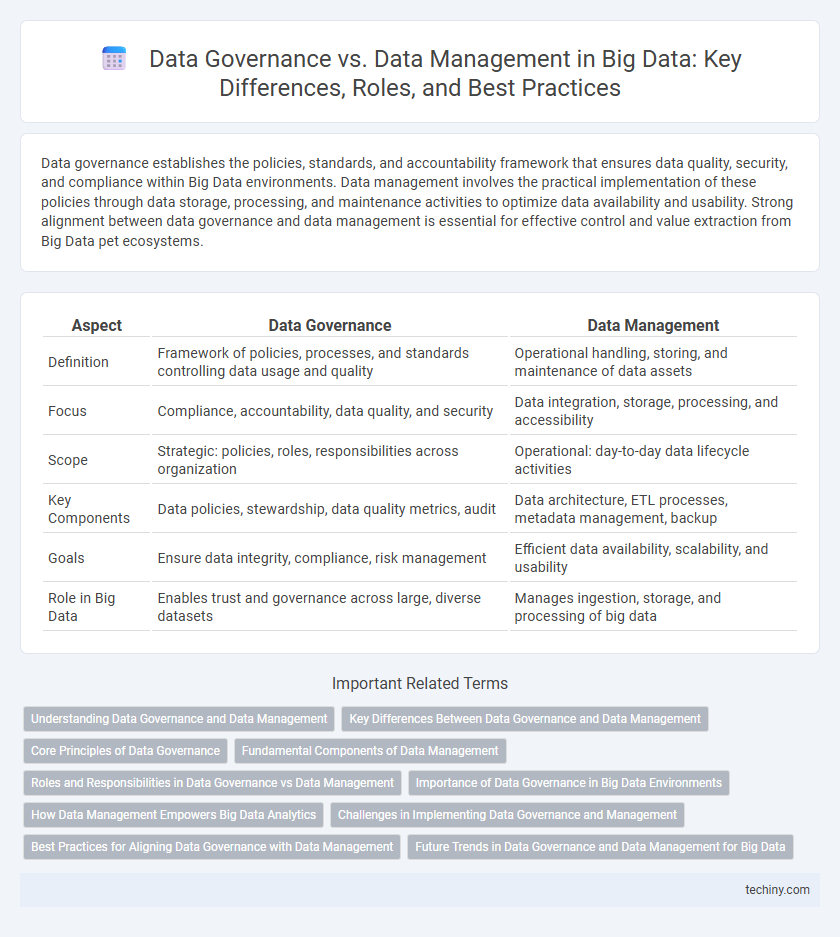Data governance establishes the policies, standards, and accountability framework that ensures data quality, security, and compliance within Big Data environments. Data management involves the practical implementation of these policies through data storage, processing, and maintenance activities to optimize data availability and usability. Strong alignment between data governance and data management is essential for effective control and value extraction from Big Data pet ecosystems.
Table of Comparison
| Aspect | Data Governance | Data Management |
|---|---|---|
| Definition | Framework of policies, processes, and standards controlling data usage and quality | Operational handling, storing, and maintenance of data assets |
| Focus | Compliance, accountability, data quality, and security | Data integration, storage, processing, and accessibility |
| Scope | Strategic: policies, roles, responsibilities across organization | Operational: day-to-day data lifecycle activities |
| Key Components | Data policies, stewardship, data quality metrics, audit | Data architecture, ETL processes, metadata management, backup |
| Goals | Ensure data integrity, compliance, risk management | Efficient data availability, scalability, and usability |
| Role in Big Data | Enables trust and governance across large, diverse datasets | Manages ingestion, storage, and processing of big data |
Understanding Data Governance and Data Management
Data Governance establishes policies, roles, and responsibilities to ensure data integrity, quality, and compliance across an organization. Data Management involves the execution of these policies through data acquisition, storage, processing, and maintenance activities. Understanding the distinction enhances the effectiveness of big data initiatives by aligning strategic oversight with operational execution.
Key Differences Between Data Governance and Data Management
Data governance establishes the policies, standards, and accountability frameworks that ensure data quality, privacy, and compliance across the organization, while data management focuses on the operational execution of data collection, storage, and integration processes. Governance defines who can take what actions with data, establishing roles and responsibilities, whereas management involves the technical activities and tools required to handle data throughout its lifecycle. The key difference lies in governance providing the strategic oversight and control, contrasting with management's hands-on operational role in maintaining and utilizing data assets.
Core Principles of Data Governance
Data Governance centers on establishing policies, standards, and accountability frameworks to ensure data quality, security, and compliance across an organization. Core principles include data stewardship, clear ownership, data integrity, privacy adherence, and regulatory compliance enforcement. In contrast, Data Management involves the operational execution of data handling, storage, and processing activities aligned with these governance policies.
Fundamental Components of Data Management
Data management encompasses fundamental components such as data quality, data architecture, metadata management, and data security, which ensure accurate, consistent, and reliable data across an organization. Data governance provides the strategic framework and policies that guide these components, defining roles, responsibilities, and standards to maintain data integrity and compliance. Effective data management relies on the integration of these core elements to optimize data accessibility and usability while minimizing risks.
Roles and Responsibilities in Data Governance vs Data Management
Data Governance establishes the framework, policies, and standards ensuring data quality, security, and compliance across an organization, with roles such as Data Stewards, Data Owners, and Governance Committees responsible for oversight and strategic decision-making. Data Management focuses on the operational execution of handling data, involving roles like Data Architects, Data Engineers, and Database Administrators who manage data storage, integration, and maintenance tasks. The distinction lies in Governance defining policies and accountability, while Management implements processes and technologies to meet those guidelines in Big Data environments.
Importance of Data Governance in Big Data Environments
Data governance establishes the policies, standards, and accountability necessary to ensure data quality, security, and compliance in big data environments. Effective data governance reduces risks related to data privacy breaches and regulatory non-compliance by enforcing consistent controls across vast datasets. While data management handles the operational aspects of data processing and storage, data governance provides the strategic framework essential for trustworthy and ethical use of big data assets.
How Data Management Empowers Big Data Analytics
Data Management enables Big Data analytics by establishing structured processes for data acquisition, storage, and quality assurance, ensuring that vast datasets are accurate and accessible. This foundation supports advanced analytics techniques such as machine learning and predictive modeling by providing reliable, well-governed data assets. Effective Data Management also integrates metadata management and data lineage tracking, improving data transparency and enhancing the decision-making capabilities of Big Data analytics platforms.
Challenges in Implementing Data Governance and Management
Implementing data governance presents challenges such as establishing clear policies, ensuring compliance with regulations like GDPR, and maintaining data quality across diverse sources. Data management faces difficulties in integrating big data due to volume, variety, and velocity, requiring scalable infrastructure and real-time processing capabilities. Both require skilled personnel and continuous monitoring to address evolving data security risks and organizational changes effectively.
Best Practices for Aligning Data Governance with Data Management
Aligning data governance with data management ensures consistency, accountability, and compliance in Big Data environments by establishing clear policies, roles, and responsibilities. Implementing automated data quality monitoring and metadata management tools promotes transparency and accuracy across data assets. Integrating governance frameworks with data lifecycle processes enhances risk mitigation and supports strategic decision-making in enterprise data ecosystems.
Future Trends in Data Governance and Data Management for Big Data
Future trends in data governance for big data emphasize automated policy enforcement through AI-driven tools, ensuring compliance and data quality at scale. Data management is evolving with advanced analytics and real-time processing capabilities, enabling faster insights and more efficient data lifecycle handling. Integration of blockchain technology for secure, transparent data lineage and increased emphasis on ethical data usage are becoming critical components in both data governance and management strategies.
Data Governance vs Data Management Infographic

 techiny.com
techiny.com